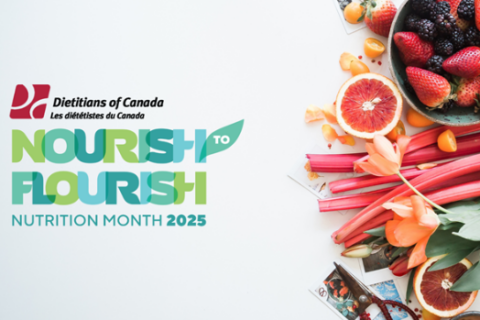The Connection Between Nutrition and Your Child’s Brain Health
March is brain health month! The brain is the most interesting and complex organ in our body (and our child’s body), regulating many core functions such as our cardiovascular, respiratory, endocrine and immune systems. There are so many factors that impact our child’s brain throughout their life, but it is “plastic” (formable) in the first few years of life (something called neuroplasticity). But what does that even mean?! As a pediatic dietitian, I’m going to walk you through it, and explain what we can do as parents (in terms of nutrition) to optimize our child’s brain health.
In the early years of your child’s life, things like nutrition, living in a safe healthy environment, and being nurtured (among other things) have BY FAR the most impact on their brain development and potential. What does this mean for parents and caregivers? Well, we have an unbelievably important (and undeniably intimidating!) role to play when it comes to raising these young vulnerable minds of tomorrow.
Safe and healthy living environments, and good physical health are two key determinants in optimizing brain health. This is exciting for me as a dietitian and mom of three, because I know HOW I feed my kids and WHAT I offer them to eat will have a positive impact on both of those determinants! Not to mention, the word that I do with Kepler Academy in terms of nutrition, menu planning and teaching will (hopefully) have a positive impact on your children too!
Here are my top nutrition tips to support optimal brain health for your kiddos!
Offer a variety of foods with brain-building nutrients
As mentioned above, experiences and influences in the first years of childhood have an extraordinary impact on your child’s brain health today and into the future. Getting the right balance of vitamins, minerals and overall nutrition is vital. Here are some key nutrients that are essential for brain development, including food sources and ideas on how to work them into your child’s day or week.
| Nutrient | Best Food Sources | Meal/Snack Ideas |
| Iron- prevents anemia which can lead to negative changes in mood, focus and physical health | Meat, fish, shellfish, poultry, beans, lentils, tofu, leafy greens, fortified breakfast cereals | 1) Garlic hummus with crackers and raw veggies
2) Spaghetti with meat (beef or bison) sauce over fortified whole grain noodles 3) Cheerios with milk |
| Vitamin B12- important for cognitive development and synthesis of neurotransmitters | Cheese, milk, yogurt, eggs, meat, fish, poultry, clams, fortified breakfast cereals, nutritional yeast | 1) Creamy clam chowder
2) Cheesy scrambled eggs with toast 3) Yogurt and berries |
| Omega 3 fats- critical building blocks for nerve cells in the brain | Fatty fish (salmon, mackerel, herring, sardines), flaxseed, chia seeds, walnuts, fortified foods (omega 3 eggs, yogurt, milk alternatives etc.) | 1) Canned salmon or tuna salad (with diced celery and mayo) on toast
2) Homemade banana flax muffins with chopped walnuts mixed in |
| Vitamin C- powerful antioxidant that helps to protect the brain | Citrus fruits, tomatoes, strawberries, bell peppers, broccoli, kiwi, cantaloupe | 1) Fruit salad made with kiwi, strawberries, and banana
2) Broccoli, bell pepper and beef stir-fry over rice |
| Zinc- important for brain development in learning and memory processes | shellfish (oysters, crab, lobster), fish, meat, poultry, legumes, nuts/seeds, whole grains, eggs | 1) Homemade sushi made with canned crab meat
2) Whole grain oats cooked, mixed with yogurt, berries and shelled/roasted pumpkin seeds |
| Iodine– essential for prevention of neurological deficits in infants and children | Fish (cod, tuna), seaweed, shellfish (oysters, shrimp), milk, yogurt, cheese, eggs | 1) Creamy shrimp linguine
2) Hard-boiled egg with fruit 3) Tuna salad sandwich |
Know the connection between food and mood
Eating regularly throughout the day is crucial when it comes to having sustained energy levels and the ability to focus and concentrate. For me personally, if I go over 3 hours without eating, the “hangry” or lethargic version of myself take over. This is also true for kids! Their growing brains actually use sugar at twice the rate when compared to an adult brain! So, when your child’s mood or behaviour is is not-so-great, it could be because they’re hungry and out of energy. Food for thought (literally)! This is because their rapidly developing brain is growing and changing every minute. A young person’s brain and body really does need a consistent supply of nourishment. This is why I suggest giving your child’s eating opportunities every 2-3 hours throughout the day. If there are large eating gaps in the day, there’s a good chance you will have an upset, hungry, and distracted kiddo on your hands.
While there are specific foods that can help your child focus and concentrate, the most important thing is to stick to a feeding schedule. Makes sure to include both carbohydrate foods (aka energy foods) AND foods that are rich in protein and dietary fat (these nutrients help to sustain that energy and keep blood sugars stable). This way your child will have plenty of opportunities to eat throughout the day, allowing for a more even blood sugar level, which we know helps with mood and focus!
Keep your kiddos hydrated
Staying hydrated may seem like an obvious factor for brain health, but did you know that children are more susceptible to dehydration than adults? Kids generally have a higher activity level than adults and they lose more water from their body when they sweat. They also rely heavily on adults to provide them with enough fluid throughout the day, and may forget to drink without gentle reminders (kiddos are often distracted during play time!). Here are some cognitive signs that your child could be dehydrated:
- They have a lower mood than usual
- They have a hard time concentrating
- They appear more sluggish/ tired
- They have a poor short-term memory
Dehydration leads to a sluggish mind and tired body. The body actually burns through its glycogen stores (energy stores) much faster when dehydrated! Research shows that hydrated school-age children have better memory, attention and overall cognitive function than their dehydrated classmates.
So how do we make sure our kids stay hydrated? Here are a few easy tips:
- Aim to offer veggies and/or fruit at every meal and snack. Eating high water content foods also count towards their hydration!
- Get a fun refillable water bottle that your kiddo is excited about. This will help remind them to take more sips throughout the day!
- Add smoothies into their breakfast or snack rotation!
Read my blog for more information on how much fluid your child needs with tips on how to get there!
Practice responsive parenting (and feeding)
Responsive parenting is when the parent or caregiver is highly attuned to their child’s internal state of mind and emotion, and responds with sensitivity and acceptance. This type of parenting is linked to have a positive impact on brain development, resulting in better language, attention, emotional, and cognitive skills. Being realistic, (and a mom of 3) I know it is not possible to be perfectly responsive to your child at all times. We also need to take care of ourselves so that we aren’t pouring from an empty cup! The key is consistency in how you provide nurturing (and responsive) care to your children so that they feel supported in a safe and predictable way.
When it comes to your child’s nutrition care, responsive feeding is powerful form of this type of parenting! With responsive feeding, you let your child lead the way, and reaffirm to them that they know their bodies best. This style of feeding also communicates trust and helps boost confidence in their self-feeding journey.
Understanding your child’s needs and responding thoughtfully with nurturing intent will protect your child’s brain from negative stress and ultimately give them the best chance at reaching their brain health potential!
References:
- https://www.who.int/publications/i/item/9789240054561
- https://ods.od.nih.gov/
- https://pubmed.ncbi.nlm.nih.gov/28614811/
- https://www.parentingforbrain.com/responsive-parenting/


